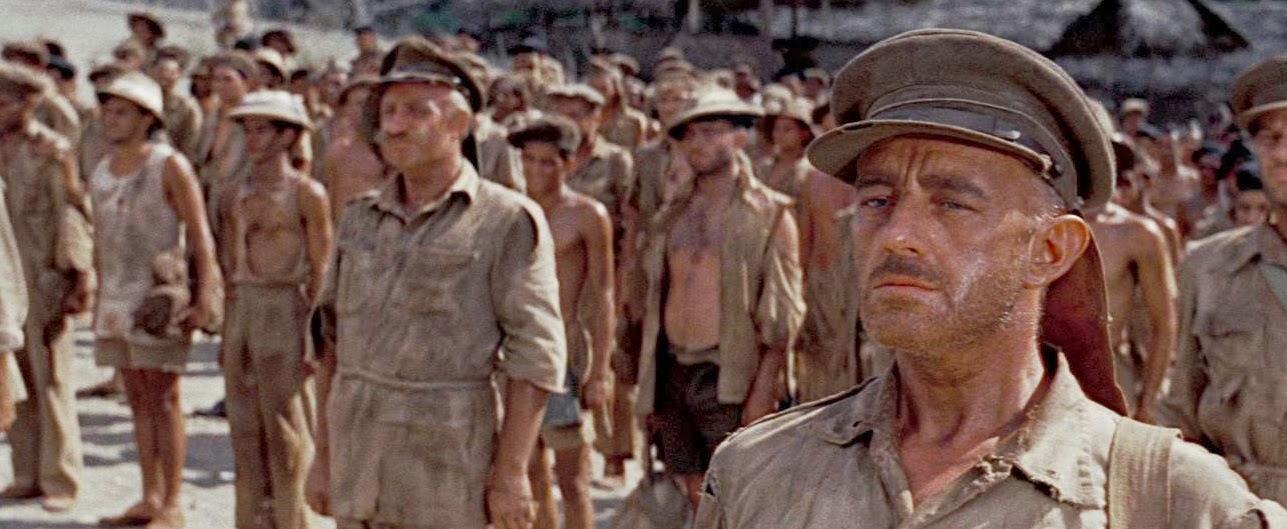
The Bridge on the River Kwai is director David Lean’s classic 1957 World War II epic set in a Japanese POW camp in Burma. The camp is overseen by Colonel Saito (Sessue Hayakawa) of the Japanese army. Colonel Saito is tasked with using the camp’s prisoners to build a railway bridge over the River Kwai by May 12th. Colonel Saito and imprisoned British Colonel Nicholson (Alec Guinness) argue over the Geneva Conventions prohibition on officers participating in manual labor while captive. After settling their differences amidst Saito’s torture of Nicholson, the British colonel oversees the prisoners’ construction of the bridge while prison escapee US Navy Commander Shears (William Holden) attempts to execute a plan by the Allies to destroy it. The film won seven Academy Awards including Best Picture, Best Director, and Best Actor for Guinness.
The Bridge on the River Kwai is a study of how pride and duty interact and intersect with one another. Three military men at the center of the film couch their behavior in terms of adhering to the rules and duties of their respective nations and armies but in reality, all of their decisions during our initial introduction to each revolve around their personal sense of pride. For Col. Nicholson, it is the pride in the spirit and work ethic of the British soldier. He is determined to show that no matter the circumstance, the British soldier cannot be broken and will also work the hardest and the strongest, no matter what he faces. Col. Nicholson presents his decision to work on the construction of the bridge as the duty of a responsible, honorable soldier but for him, doing this work, even on behalf of the enemy, is a display of the superiority of the military force and people to which he belongs. By making the bridge in a better way and more efficiently than his Japanese captors, he is displaying the British people’s indestructible spirit and superior intellect, and therefore his own. For Col. Saito, his source of pride is in besting the arrogant British and in completing the task given to him by the Emperor so that he will not face the ultimate shame, Japanese ritual suicide, or <i>seppuku</i>. After losing his battle of wills against Col. Nicholson over forcing allied officers to work, Col. Saito is shown crying in his private quarters while listening to the captives showering Col. Nicholson with cheers and praise for outlasting his torture at Col. Saito’s hands. That he came to a compromise that might possibly allow him to complete the bridge was no matter, he’d lost face and gained a major blow to his pride. Major Warden (Jack Hawkins), a British officer who leads the mission to blow up the bridge, shows his pride in just the opposite manner of Colonel Saito, determined to see the completion of his mission no matter the cost, even if it means dying for it. After being severely injured while killing a Japanese soldier who discovers the clandestine military men, Maj. Warden attempts to stay behind and ingest the suicide pills all were given so as not to slow them all down.
This conflation of pride and sense of duty play out in a tense, explosive third act that sees the destruction of the bridge and dozens of lives simultaneously. In preserving his work, Col. Nicholson prevents allied soldier Lieutenant Joyce (Geoffrey Horne) from blowing the bridge at the cost of Joyce’s life and a shootout involving numerous soldiers, both allied and Japanese. As the he stands before the bodies of Commander Shears and Lt. Joyce, Col. Nicholson snaps out of his pride induced haze and realizes the gravity of his actions. In his dogged maintenance of his pride of being a British soldier, he has become derelict in his <i>duty</i> as a British soldier in the war effort against the Japanese. What started out as being one in the same in his eyes, have slowly separated and become conflicting, in an extremely tragic way. While this is happening, Maj. Warden shells the Japanese troops who have come to assist Col. Nicholson in stopping the bombing, along with many of the prison captives, much to the horror of the Siamese women bearers that helped the group reach the river in time to destroy the bridge. As they look on at the carnage, and at Maj. Warden in disgust, he pleads with them that he had to do it in order to see the mission through and ensure it remain unthwarted. In adhering to this “sense of duty” he’d lost both his sanity and humanity, as is emphasized during the final piece of dialogue from British medical officer Major Clipton (James Donald) screaming “Madness!” while looking at the bodies scattered in front of him.
The ending is an apropos exclamation point on the film’s second theme of the effect of war on the psyche of those who participate in it. All of the main characters in the film are forced to make decisions or choose to do things that they either come to regret or die for because of the obligations thrust upon them as soldiers during wartime. The sense of duty that they all had become slaves to led them to disastrous paths that cost them all dearly.
The Bridge on the River Kwai is a all-time classic film that expertly displays the toll that war takes on the human mind. The examination of its characters is well paced and thorough, culminating in a tense, engrossing finale. Visually, the cinematography in the film stands up in Sony’s 4K restoration even sixty years later, with rich, vibrant color present throughout its shots in the south Asian jungles. Every film fan would do well to add this movie to their watch list.
Image: Columbia Pictures

